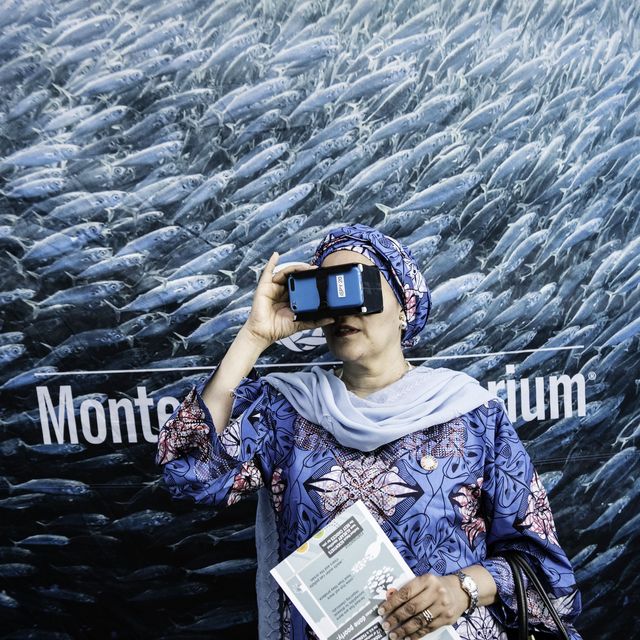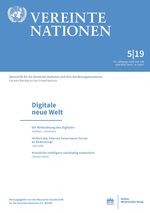The UN and the Commons: New Alliances for the Digital Age?

In their recently published flagship report “Towards Our Common Digital Future”, the German Advisory Council on Global Change (Wissenschaftlicher Beirat der Bundesregierung Globale Umweltveränderungen, WBGU), states that “digitalization dynamics have a massive impact on all 17 SDGs of the 2030 Agenda.” As a result, aiming to reduce inequalities and achieve a just and sustainable future for all requires thinking beyond the enabling potential of digital technologies. For too long, we have been focusing solely on the implementation of the Sustainable Development Goals (SDGs) by making use of digital means and have neglected the need to shape the digital transformation as a whole. This requires acknowledging economic and political power shifts in the wake of this transformation and developing the means to give everyone the opportunity to share in the potential of the digital age. The WBGU thus recommends amongst other things creating “digital commons as a public service”. How can international organizations such as the UN support these efforts?
A return of the commons
The concept of the commons has been popularized by Nobel Prize economist Elinor Ostrom. Commons are understood as collectively governed material or immaterial resources, with a governance structure ensuring a distribution of rights among partners contributing to the commons and aiming at a coordinated exploitation of the resource. This structure is designed to ensure the long-term sustainability of the resource. Commons are not unknown to the digital age. On the contrary – the open protocols at the core of the internet can be considered as such. The free software movement – which powers most of the servers used to host data and cloud services today – is another example of already existing digital commons. This movement is rooted in a political understanding of the relationship between technology and its impact on society, with the intention to redefine the underlying power structures of production and consumption. The emergence of shared digital infrastructure, open software or freely accessible data hence can be considered a “return of the commons.” There are three reasons for this development:
- Digital goods can be reproduced easily, which limits their competitive, rival and exclusive character. This is the argument of authors like Steven Weber, who even considered some digital goods as “anti-rival”, as their value can increase when other people use them.
- The steep decline of communication and collaboration costs has led, according to Yochai Benkler, to the emergence of a new production mode, which he coined “commons-based peer production”. Building on Ronald Coase’s theory of the firm, he explains that this new mode of production has a large relative advantage in comparison with market and organizations in a context where innovation has become the main source of value creation, because peer production is more efficient in identifying the best available human capital.
- Digital commons are resources openly accessible, but also open to contributions from anyone. The best-known example, Wikipedia, is developed by people from around the world, at a rate of 1.8 edits per second. This openness supports the protection of fundamental human rights as it allows for a non-discriminatory access to information and make the infrastructure available to enjoy the right of freedom of expression.
In the long run, digital commons can be a catalyst for sustainable development, as they lay the ground for a more equal distribution of innovation capacities. They can promote a level-playing field by enabling all people access to information, services and the means for local value creation instead of concentrating economic power in a few private hands. They represent tangible cooperation projects between citizens from various countries and origins. As such, they have managed something that traditional international cooperation has promised but is still struggling to deliver – partnerships of equals, truly empowering for all parties engaged. In fact, commons-based peer production does not rely on vertical knowledge transfer, but rather on mutual learning based on co-creation.
Fostering an ecosystem
To ensure successful governance and long-term sustainability, commons need a vivid, dedicated ecosystem to thrive in. More specifically, they are driven by a population of users spontaneously and informally uniting around a shared project, outside the scope of markets or bureaucracies. Based on this observation, one could quickly conclude that there is nothing the UN could do to promote digital commons, even though their development seems to be in line with UN objectives and values. However, a supportive ecosystem needs more than contributors, users and maintainers such as organizations like Wikimedia. It also needs sustainers: governments, NGOs, donors or commercial companies, which are concerned with the future of the common good and help keep it alive.
It is here that the UN and its instruments should play an active role to help build a strong peer production sector. The UN can achieve this by doing the following:
- Using its normative power to raise awareness and set standards: The UN can play a decisive role in harmonizing legal frameworks for digital commons worldwide. Although work in the public domain can be used without obtaining permission, there exist many jurisdictional definitions of the public domain, making it hard to determine if a work can be used in a certain country or even globally. Similar to UNESCO’s advocacy for the information commons, the UN should take on the task to urge Member States to recognize the right of accessing the digital commons worldwide and propose a legal definition of digital commons, which allows building a truly global public domain in the digital age.
- Using its convening power to set agendas and align stakeholders: By starting a conversation around digital commons and bringing people and organizations together, the UN can help raise awareness for existing efforts, stimulating demand and commitment. It is central to the development of digital commons to build a diversified ecosystem of stakeholders who share the same vision and bring in their own resources. In the field of artificial intelligence, the idea of “data commons” has already emerged over the past year at the ITU’s AI for Good Summit and is discussed in the newly published report of the UN Secretary-General’s High-level Panel on Digital Cooperation. The UN can help advance these efforts, e.g. by calling for an UN summit on commons in the digital age.
- Developing innovative funding mechanisms: The WFP Innovation Accelerator in Munich set an example for new, UN-led supporting structures for the development of innovative digital solutions to advance progress on the SDGs. Similar to this, the UN could invest in the development and maintenance of innovative digital commons with a global digital commons fund. It could free open source communities from the financial burden that comes with providing a public service. Instead, communities could then focus on grooming and growing their ecosystem, thus building the foundations for democratizing the potential and development of digital technologies.
The digital age calls for new, unusual ways of thinking and unlikely alliances to ensure that digital technologies are developed inclusively and geared towards the benefit of people and societies. From this perspective, the above-mentioned call for digital commons as a public service is very much welcomed and progressive in its approach. By taking up this line of thinking, the UN could launch itself into the digital age by simultaneously upholding old beliefs and forging new paths to advocate for them.
Lea Gimpel is a senior expert at GIZ’s competence center “Digital Society”. Jan Krewer is working for the GIZ in Rwanda. The article reflects the personal opinion of the authors.



